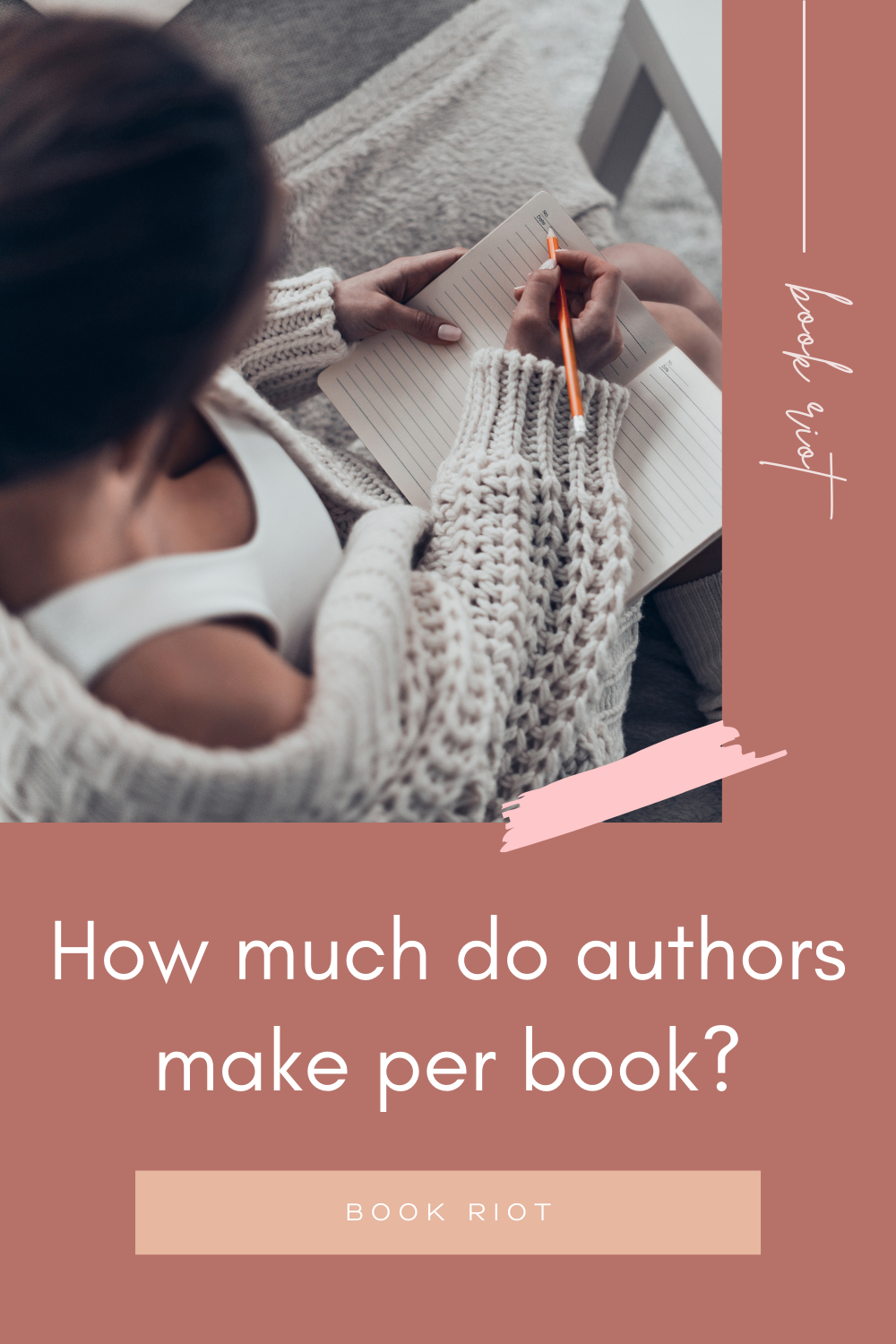How Much Money Do Textbook Authors Make
This content contains affiliate links. When you buy through these links, we may earn an affiliate commission.

How much do authors make per book? As with everything else in publishing, the answer is: It depends. A lot of readers have the idea that every author is wealthy, but that is far from the truth. Yes, Stephen King probably has more money than he'll ever need, but he is an outlier. The majority of authors don't even make a living wage with their books.
In 2018, the Authors Guild partnered with 14 other writers organizations as well as some publishing platforms to conduct a survey of 5,067 professional writers in the United States. The median 2017 income of participating authors was $6,080 with just $3,100 of that being from book income alone (as opposed to speaking fees, teaching, book reviewing, and other supplemental activities). The median income of people who described themselves as full-time authors was just $20,300 when including all book-related activities.
How do authors get paid?
Before we get into the numbers, I want to explain how author payment works in the traditional publishing industry, since I've seen a lot of confusion about it. Typically, when an author signs a publishing contract, they or their agent negotiate an advance against royalties. When a press release or article states that a book "has sold for" so many dollars, this amount is the advance and not a flat purchase price. An advance is often paid in three installments: when the contract is signed, when the manuscript is accepted by the publisher, and when the book is published. Some publishers may break down these payments even more.
Once the book is published, authors make a percentage of sales (more on this later) for each book sold, which are their "royalties." However, since they have received an advance against royalties, they are essentially earning money they have already been paid. They don't get paid again until their royalties have surpassed their advance amount, which can take any amount of time from before the book is even published until…well, never. Once a book has made the author the amount of royalties they were advanced, they begin to earn additional royalties; this is often called "earning out." If the book never makes the advance back, the author does not have to pay the overage back to the publisher, except in circumstances where they have violated/terminated the contract.
This is a general description of the process and there are any amount of variances. For example, some authors will receive no advance and many authors who write for established intellectual properties will receive a flat amount instead of royalties. All of this to say that some traditional authors will never receive more than that initial advance payment, while some authors may continue earning money on books until they die. And some authors lose money if they spend more on promotion, marketing, and expenses than they end up making.

How much do authors make per book?
A traditionally published author makes 5–20% royalties on print books, usually 25% on ebooks (though can be less), and 10–25% on audiobooks. Amazon pays self-published authors 70% on ebooks priced 2.99 to 9.99, 35% on ebooks priced outside of that, 60% less printing costs on paperbacks sold on their platform, and 40% less printing costs sold via expanded distribution.
In traditional publishing, the publisher manages the process and pays for all costs associated with producing and distributing the book as well as a widely varied amount of marketing, while a self-published author is responsible for that process and those costs.
When I teach classes and am asked how much do authors make, people tend to be deeply unsatisfied with my "it depends" answer. There is no way to predict how much a book will make, but I spoke with 15 authors of all stripes to demonstrate the variety of options. I spoke with self-published authors and traditionally published authors who have made less than they spent on expenses, authors of both paths who easily make a living off their writing, and everyone in between.
While there are many author earning surveys done by a variety of organizations, they are self-reported and only reach the sphere of influence of the organization. Much like with this article, mega bestsellers -— think Stephen King or James Patterson — don't participate in those surveys. I would also like to caution against reading any kind of "data" on author earnings from websites that are also trying to sell you author services. I ran across many of these in my research and the numbers they present are incredibly skewed and intentionally misleading.
Two of the highest-earning authors I spoke to were both romance authors, but with very different stories. Hazel* publishes adult romance with a big five publisher and has two books out so far. Her first deal was for two books with a $50,000 total advance. Her first book was a Book of the Month Club selection and has earned an additional $42,000 in royalties so far. She sold another two books for a $70,000 advance and was able to quit her day job with the assistance of her husband's income. She's spent about $11,000 over the past two years promoting the first two books, including travel from 2019. "I would say that my writing income doesn't quite replace what I made working full-time, but it's enough that we're able to make it work," with her husband's job providing health insurance for both of them.
Ari* is a self-published romance author with 50+ books who makes a high six figures each year. She spends up to $8,000 per book on editing, covers, and promo excluding travel. "It took a year of writing for me to make sure I made 3x my former job's salary for me to feel comfortable writing full time. My spouse did not have a stable income as he was in graduate school and we went without medical insurance for a year since I was paying high costs even with my employer. It was a scary time when we decided to make this choice, but it was the best choice for us at the time."
Sue London is a self-published author of historical romance, including the Haberdashers Series, with six novels and 16 novellas published since 2013. She's made anywhere from $8,000 to $68,000 a year, depending on her output. She spends $500 to $4,000 per year on promo, not including covers. "There was a moment in 2015 when I thought maybe I could do it full time, but my husband had to leave work on disability and now I'm the primary breadwinner. My day job is our primary income (about $150k) so to consider retiring to full-time writing would have to increase sales enough to cover both my income and the relevant benefits."
Romance is the largest segment of the consumer book market and also the market most welcoming of ebooks, so there are a lot of self-published (and hybrid) authors making a living there. There are also, of course, plenty of authors making just a couple hundred per book. Sherie* has published six books with digital publishers and self-published two. She didn't receive an advance for any of the books and has earned a total of $750 on all of her books. She has won RWA chapter awards and spent more than $5,000 going to book signings and conferences and self-publishing her books. In 2019, she made about $500 for teaching workshops and doing presentations, but that work has decreased during the pandemic.
Saadia Faruqi, author of A Thousand Questions, has published 20 books including children's fiction, adult fiction, and nonfiction. She's received "very low royalties" for her adult work, but her children's books have done better. With 16 books in her Yasmin series, she earns about $35,000–45,000 per year, despite small ($2,000–5,000) advances. She also makes about $15,000 a year from school speaking engagements. In 2020, she published a middle grade novel with a $60,000 advance, which has not earned out yet. She's able to make a living with her book income, but only recently, after working a part-time job and her husband being the major breadwinner for their family. "With the switch to full-time writing, I'm able to write more books in the year. I attribute my high income to the rate of writing, which allows me to sell several books a year in a variety of age categories."

Quinn* is a middle grade author with a Big 5 publisher who signed a two-book deal for $150,000 and sold a third book for $65,000 before the second book was released. She says she hasn't spent very much on promotion and quit her part-time job a couple of months before the book came out, but mainly due to childcare costs. "My husband does make enough income that we could get by even if I didn't make money, which has taken some of the pressure off as well."
Maxym M. Martineau's Kingdom of Exiles was originally sold as adult fantasy in a three-book deal for $9,000 but the publisher did a special young adult release and it did better in that market, so the rest of the series was published as YA. The book has been featured in Entertainment Weekly, New York Times, and earned a starred review from Publishers Weekly. She has earned an additional $5,000 in royalties and has sold three more books for $10,500 as well as a German edition of the first two books for €9,000. She has spent about $2,000 of her own money promoting the book but also has had significant publisher support.
Also in YA, we have Cory*, a YA author published with a mid-sized press. Their 2015 urban fantasy received a $500 advance and has earned $700 in additional royalties while their 2016 F/F romance received no advance but has earned over $7,000 in royalties, with about $500 spent in promotion on each book. They also make about $5,000 each year in other author-related income that they aggressively pursue.
Taylor* has four small-press novels — which garnered no advance, but bring in about $30 per month in royalties total — and three mid-sized press novels, each with a $2500 advance. The first of the latter has earned and made about $300 additional in royalties. Taylor also said about half of their publishing income comes from appearances, which is in line with the data from the 2018 Authors Guild survey.
Jessie* is a YA author with a big five publisher and ten books under their belt, including some intellectual property work. Their first deal was for $7,500 with a small press but the buzz was impressive so the week after release, they sold two more books for six figures. They have been nominated for several major awards, included on impressive lists, and have hit the bestseller lists for their IP projects, which pay less per book but see a higher volume of sales.
Jamie Krakover is a self-published author of the YA sci-fi book Tracker220. She has made $200 on the book since its October release but has spent $1,800 to promote it. Some of those ads and opportunities haven't yet had a chance to make an impact on sales, but she's optimistic. "Indie authors typically have to build a pretty decent sized backlog before they can make enough to sustain," she told me.
Bharat Krishnan, author of Privilege, is also a self-published author of seven books who said he's made "several thousand" and "might crack five figures in the next year." He said he's spent "a couple thousand" and has a day job to support him, but his writing has helped him taken a few international trips.
Jon Chaisson is a self-published author of five SFF books, starting in 2015. He says his income is "almost nil at this point, but I think I've maybe earned a few hundred dollars over the course of the last five years" but "if I remain in the public eye and constant in my output, then I'll eventually find my fanbase and will have a back catalogue to back it all up."
Popular science-fiction author Jim C. Hines has been publishing his income reports every year since 2007. He's never hit a bestseller list, but his last five books have been lead titles for his publisher. He made $31,411 in 2020, including $13.5k from a Kickstarter. In 2016, he also published a survey of almost 400 authors' income, which resulted in an average of $114,124, but a median of $17,000, meaning a handful of high-earning outliers were bringing that average up.
Alex* is another popular science-fiction author with a large publisher. His first book deal was for two books for $15,000. The first book has earned over $40,000 in additional royalties and the second book has earned $20,000 more. He signed a second two-book deal for $30,000. He's spent about $500 in ads and about $5,000 traveling to promote his book but admits "almost all of that is for my own entertainment rather than expecting anything to come out of it. I like meeting and hanging out with other authors, so I do it." He is retired with a pension and healthcare taken care of, but he made about $60,000 in 2020 and expects to hit six figures in 2021.
Speaking of six figures, I suggest any authors looking to make a living self-publishing books check out the Six Figure Authors podcast, as the three authors there share a lot of detail about how they manage their successful writing careers.
The second-largest fiction market, after romance, is mystery/thriller. Riley* is a bestselling mystery author with a large publisher. Their first deal was for two books for $25,000 total, but the books went on to win major awards and sell a quarter-million copies. They haven't spent much money promoting their books, but "spent a ton of time writing articles and pitching pieces to promote the books." They currently make about $150,000 per year. "Right now I'm the main financial support for my family, although we get our health insurance through my husband, which is huge."
Nick* has seen the difference genre makes. He published a short literary story collection with a small press in 2013 and a horror novel with a large independent press. The first earned him a $1,000 advance and no royalties, while the second earned him a $35,000 advance plus $4,000 for foreign rights. He has a job as a university professor to pay the bills, but it also affords him the opportunity to read or speak at other universities that pay him $500–1,000 per appearance. In 2020, he was awarded a large prize of $25,000 and has won other prizes with smaller awards of around $1,000.
Most of the authors I spoke to who are able to write full time would not have been able to do it without the financial support of their spouses or family members. Though I didn't ask about health insurance, many of them mentioned their spouse-provided or state-provided (for those not in the U.S.) health insurance plans as a major factor. If they have to pay for their health insurance, many authors would have to make not just their regular salary to be able to go full-time, but 1.2 to 1.5 times their regular salary at a minimum. Considering how much they make per book, and the fact that most authors need a year or more to write and sell a book, that's not feasible for many of them.
Not to mention the work doesn't end once the book is written. Maxym added, "One of the things that's hard to quantify from a monetary perspective is the amount of time and emotional labor that goes into networking and finding ways to connect with people who do have a platform to elevate your work…There's no dollar amount attached to that, but the hours spent doing that work do have value, and when opportunities don't pan out, it's a punch to the gut." She added that if you have other jobs or responsibilities, it's very difficult to find that time.
So how much money does an author make? It still depends. We often hear about big splashy seven-figure deals, but those are definitely outliers in the industry. For the majority of authors, the true answer to that question is "not enough," which goes to show writing the books you love is often a labor of love for the authors themselves.
Many thanks to the authors who shared their information with me. Money in this industry is a touchy subject, so I appreciate your frankness. Authors who are named agreed to being named and those who requested anonymity have had their names randomly changed, which is denoted with a * symbol.
How Much Money Do Textbook Authors Make
Source: https://bookriot.com/how-much-do-authors-make-per-book/
Posted by: handhadeventing.blogspot.com

0 Response to "How Much Money Do Textbook Authors Make"
Post a Comment